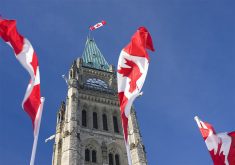In a small Ethelbert, Man., diner one day last week, a newspaper lay open to a story about Conservative leader Jean Charest’s “victory” in the English-language leaders debate.
One of the lunchtime diners mentioned that Charest was doing well. “Did you watch the debate?” asked a companion.
“Hell, no. I had better things to do.”
That’s the funny thing about the televised election leaders’ debate.
It has taken on enormous strategic significance, strengthened by the conventional wisdom that it helped win the 1984 election for Brian Mulroney and almost lost it for him in 1988 when he faced anti-free trade crusader John Turner.
Read Also

Growth plates are instrumental in shaping a horse’s life
Young horse training plans and workloads must match their skeletal development. Failing to plan around growth plates can create lifelong physical problems.
Yet much of the assessment of winners and losers comes from someone else, usually media or political analysts in the moments after the debate ends.
A quick, subjective judgment is made and a winner proclaimed.
Voters hear it, are interviewed, confirm what they have heard and give the assessment even more credibility.
It wasn’t supposed to be that way. The first leaders debate in 1968 was a low-key affair featuring Pierre Trudeau, Robert Stanfield, Tommy Douglas and Creditiste leader Real Caouette for a brief appearance of comic relief, playing much the role that Preston Manning played in last week’s French-language debate.
It was considered a sideline to traditional campaigning. But something happened that night.
Trudeau, with his striking face and arrogant charisma, was made for television and solidified his position as a new-style leader. Stanfield was outshone.
Political handlers discovered that the impact of the performance went far beyond the small viewing audience. News reports accentuated Trudeau’s performance and Liberal crowds grew.
By 1997, the debates have become the centrepiece of campaign planning.
Strategists talk of two campaigns – the weeks before the debates when candidates establish their themes, and the weeks after the debates when those who scored well try to build momentum while those who stumbled try to recover.
Judgments are made largely on style rather than content. Outrageous claims of accomplishments or promises can actually score points if they are made cleverly or if the sincerity is well faked.
The debates are kind to those with authority in their voice, a spring in their rhetorical step and a few memorable turns-of-phrase. They are less kind to those with unfortunate faces or voices, those who prefer to plod through detail or those simply not loud or dominant enough to break into the free-for-all.
Before last week, Conservative handlers had bemoaned the fact that while voters seemed to like Charest, they distrusted his party and were skeptical of Tory promises to cut taxes, cut spending and still spend more on health and education.
The beauty of the debate is that marks are given for style rather than substance. Voters got to look at him, and hear him judged, in a whole new light.
“The campaign starts now,” Charest said the morning after, as good reviews rolled in. “It’s about leadership. It’s about the future.”














